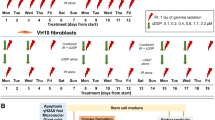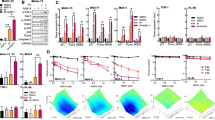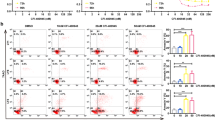Abstract
Human lymphoblastoid cells were transfected with expression vectors containing p53 cDNA mutated at either codon 135 or 246. The cells were subjected to cisplatin treatment or γ-radiation and observed for changes in the cell cycle arrest and apoptosis. We found that compared to the parental cell line, cells overexpressing mutant p53 (either 246val or 135ser) exhibited decreased apoptosis in response to γ-radiation or cisplatin as measured by: propidium iodide (PI) staining of the cellular DNA (cell cycle analysis) and decrease in PARP (poly ADP-ribose polymerase) cleavage as detected by Western blotting. Interestingly the cells expressing mutant p53(135ser) protein were less resistant to cisplatin-induced apoptosis than the p53(246val)-bearing cell line. A significant decrease in the G1/S arrest assayed by bromodeoxyuridine and PI staining (cell cycle/proliferation assay) was also observed in response to irradiation and cisplatin in cell lines expressing either of the mutant p53 constructs. A lower basal level and reduced magnitude of protein induction of the cell cycle inhibitor p21/Waf1 was seen both after cisplatin and γ-radiation treatment in the mutant p53 expressing lymphoblastoid variant when compared to the wild type p53 parental cell line but induction of the p53 regulator MDM2 was comparable in both. No increase in basal levels of Bc12 protein in wild type or mutant p53 expressing cells was observed in response to cisplatin or irradiation. Unexpectedly, following cisplatin treatment we observed an increase in mutant and wild type p53 RNA steady state levels in addition to increased levels of p53 protein. These results suggest that irradiation or cisplatin treatment may not only stabilize wild type p53 protein but also may increase the steady state p53 RNA levels. Finally these results indicate that both irradiation and cisplatin should be used with caution in the treatment of lymphoid tumors bearing mutations of p53.
This is a preview of subscription content, access via your institution
Access options
Subscribe to this journal
Receive 50 print issues and online access
$259.00 per year
only $5.18 per issue
Buy this article
- Purchase on Springer Link
- Instant access to full article PDF
Prices may be subject to local taxes which are calculated during checkout
Similar content being viewed by others
Author information
Authors and Affiliations
Rights and permissions
About this article
Cite this article
Piovesan, B., Pennell, N. & Berinstein, N. Human lymphoblastoid cell lines expressing mutant p53 exhibit decreased sensitivity to cisplatin-induced cytotoxicity. Oncogene 17, 2339–2350 (1998). https://doi.org/10.1038/sj.onc.1202147
Received:
Revised:
Accepted:
Published:
Issue Date:
DOI: https://doi.org/10.1038/sj.onc.1202147
Keywords
This article is cited by
-
Identification of potential novel drug resistance mechanisms by genomic and transcriptomic profiling of colon cancer cells with p53 deletion
Archives of Toxicology (2021)
-
The consequence of p53 overexpression for liver tumor development and the response of transformed murine hepatocytes to genotoxic agents
Oncogene (2000)



